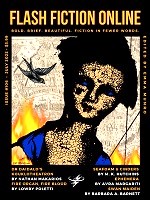 Flash Fiction Online #106, July 2022
Flash Fiction Online #106, July 2022
“Dr Daidalo’s Kouklotheatron” by Nathan Makarios
“Fire Organ, Fire Blood” by Lowry Poletti
“Seafoam & Cinders” by M. K. Hutchins
“Ephemera” by Avra Margariti (reprint, not reviewed)
“Swan Maiden” by Barbara A. Barnett (reprint, not reviewed)
[Editor’s note: Issue #105 for June 2022 was an all reprint issue and thus not reviewed.]
Reviewed by Victoria Silverwolf
All of the stories in this issue, new or reprinted, are fantasy.
The main characters in “Dr. Daidalo’s Kouklotheatron” by Nathan Makarios are a man and the child he created from wood and clockwork. The man thinks of the boy as his son. They operate a theater for children. Violent events threaten their peaceful existence.
The editor’s introduction states that this story takes place during riots that rocked Istanbul in 1955. A little research reveals that these were government-directed attacks on the city’s Greek minority. Without this information, which is not revealed in the text itself, the reader is unable to fully appreciate the tragic events of the plot.
The story is very well written, and this is an impressive first publication for the author. Whether the fantasy premise adds much to an inherently dramatic situation is another question.
In “Fire Organ, Fire Blood” by Lowry Poletti, a woman uses alchemy in order to produce flames from her mouth. Her motive is to join with a flock of dragons, one of which visited her as a child.
This simple synopsis fails to capture the dream-like style of the story. Like other pieces in this issue, it is beautifully written. Much more of a mood piece than a plot-driven tale, it will best appeal to readers of a romantic nature.
“Seafoam & Cinders” by M. K. Hutchins mixes the famous Hans Christian Andersen story “The Little Mermaid” with the traditional fairy tale of Cinderella. The mermaid, now an insubstantial spirit performing good deeds in order to win a soul, serves as Cinderella’s fairy godmother.
The story is a little subtler than I have made it sound, although the influence of the two well-known tales is obvious. As with other pieces in this issue, it is best appreciated as an example of fine writing.
Victoria Silverwolf worked four extra days this week.